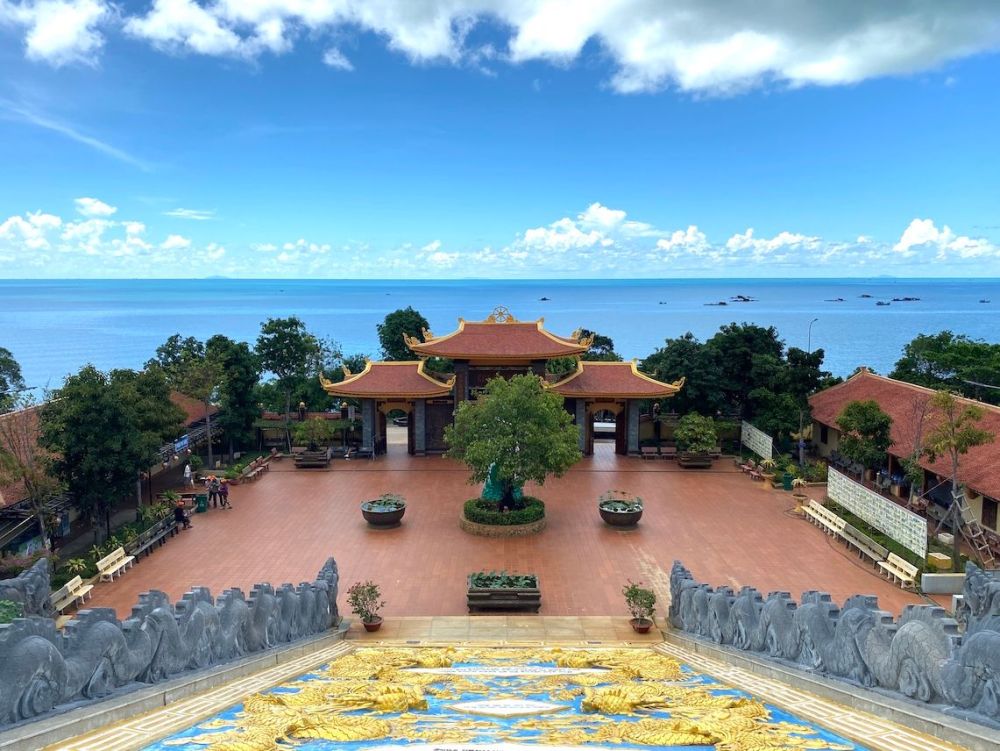

Phu Quoc, Vietnam's largest island, is a tropical paradise that has seen its tourism sector flourish remarkably over recent years. Nestled on the island is the serene and majestic Ho Quoc Pagoda, a relatively recent addition to the island's cultural and spiritual landscape that has quickly become a must-see destination for tourists and pilgrims alike.
The history of tourism in Phu Quoc can be traced back to its humble beginnings, where it was primarily known for its fish sauce production and pristine beaches. It wasn't until the late 20th and early 21st centuries that Phu Quoc's tourism potential was recognized, thanks to its untouched natural beauty and biodiversity. The Vietnamese government, recognizing the island's potential, started investing in infrastructure and marketing, which has led to a steady increase in international visitors.
With an international airport opening in late 2012 and simpler visa requirements for many countries, Phu Quoc has become much more accessible to the global community. In the past decade, luxury resorts, eco-tourism activities, and cultural attractions have sprung up, transforming the island into a well-rounded holiday destination.
Ho Quoc Pagoda, also known as Truc Lam Ho Quoc Zen Monastery, was inaugurated in 2012. With its striking architecture and panoramic views of the sea, it quickly became embedded in the island's spiritual and cultural itinerary. The pagoda's importance lies not just in its ability to attract tourists, but also in its embrace of the local community's spiritual needs.
The design of Ho Quoc Pagoda is a harmonious blend of traditional Vietnamese Buddhist elements and modern architectural excellence. It is located on a sloping hillside facing the sea, which allows visitors to enjoy breathtaking sunrise views. The main hall is impressive with intricately carved dragons and a large statue of the Buddha. The pagoda is surrounded by lush gardens and forest, creating a tranquil environment for reflection and meditation.
Since its establishment, Ho Quoc Pagoda has contributed significantly to the diversification of Phu Quoc's tourism scene. Visitors are drawn not only to the island's beaches and natural parks but also to its cultural and spiritual offerings. Ho Quoc Pagoda provides a tranquil contrast to the bustling beach resorts, offering a glimpse into Vietnam's religious practices.
Recent trends in Phu Quoc's tourism reflect a global shift towards sustainable travel and experiences that showcase local culture. Tourists are increasingly interested in community-based tourism, where they can interact with local communities and participate in traditional activities.
Agri-tourism is also gaining popularity, with visitors eager to learn about local farming practices and the production of Phu Quoc's famous fish sauce. Furthermore, the island is making efforts to promote ecotourism with initiatives to protect its marine and jungle environments.
In conclusion, the beauty and serenity of Ho Quoc Pagoda, along with Phu Quoc's evolving tourism scene, makes this island a unique destination that appeals to a wide range of travelers, from those seeking relaxation to others who wish to explore Vietnam’s rich cultural heritage.